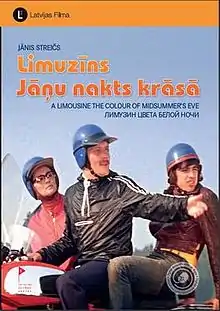A Limousine the Colour of Midsummer's Eve
A Limousine the Colour of Midsummer's Eve (Latvian: Limuzīns Jāņu nakts krāsā, Russian: Лимузин цвета белой ночи, romanized: Lymuzyn tsveta beloy nochy) is a 1981 Latvian TV-film, a comedy directed by Jānis Streičs.[1] Movie was produced by Riga Film Studio. The film was awarded the Latvian National Film Prize Lielais Kristaps in 1981.[2] The film is included into Latvian Culture Canon, and voted all-time best Latvian film in popular vote.[3] It is shown every year on TV prior to the summer solstice festival of Jāņi, which is a national holiday in Latvia. The movie is about the struggle of two related families for the eighty-year-old aunt's inheritance through comic and romantic events.[4]
| A Limousine the Colour of Midsummer's Eve | |
|---|---|
 | |
| Directed by | Jānis Streičs |
| Written by | Māra Svīre |
| Starring | Lilita Bērziņa Olga Dreģe Ēvalds Valters Uldis Dumpis Diāna Zande |
| Music by | Raimonds Pauls |
| Cinematography | Harijs Kukels |
| Edited by | Margarita Surdeko |
| Distributed by | Riga Film Studio |
Release date | 1981 |
Running time | 83 min |
| Country | Latvian Soviet Socialist Republic |
| Language | Latvian |
Plot
The movie begins when old auntie Mirta (Mirta Saknīte) succeeds in a lottery and wins a car which every Soviet citizen longs for – a Zhiguli car. Because of her old age, she cannot use the car herself. And when the word spreads out about her luck, different family members all of a sudden come to her countryside house to 'be helpful' in favour to get the car after aunt's death. Mirta's nephew Ēriks with his wife Dagnija and their son Uģis decided to give up their holiday to Carpathian Mountains just to lay their hands on aunties' legacy. Not only Mirta's nephew decided to surprise her with his arrival but her ex-daughter-in-law Olita together with her new family including her new husband Viktors and their offspring Lāsma.[5]
The funny rivalry between two sides of the family, foolish jealousy of the near living peasants' family, who had always non-selfishly been there for auntie Mirta, is a caricature of greasy human nature. This is a slight humor of the Soviet life details as well. But aunt Mirta isn't a fool, she is still young in her heart until her very last breath, which also can be seen in her last will - to whom she left her car to, a Limousine The Colour Of Midsummer's Eve.[6]
Family members
- Aunt Mirta (Mirta Saknīte) — Lilita Bērziņa
Tūteri family
- Dagnija — Olga Dreģe
- Ēriks — Uldis Dumpis
- Uģis — Gundars Āboliņš
Sprēsliņi family
- Olita — Baiba Indriksone
- Viktors — Boļeslavs Ružs
- Lāsma — Diāna Zande
Awards
A Limousine the Colour of Midsummer's Eve in 1981 was named as the best full-length movie that year by Latvian National Movie Festival "Lielais Kristaps".
The movie was also included into Latvian Culture Canon
Reconstruction
In 2008, the movie was restored from what it originally looked like. All the technical failures that occurred during the filming were improved, including the audio of the film or "sound path" and colours were added where necessary.[7] Also, more detailed information about the main heroine of the movie (Lilita Bērziņa) was included into the DVD.[8]
Cast
- Lilita Bērziņa ..... Aunt Mirta
- Olga Dreģe ..... Dagnija Tūtere
- Uldis Dumpis ..... Ēriks Tūters
- Gundars Āboliņš ..... Uģis Tūters
- Romualds Ancāns ..... Jāzeps Gilučs
- Baiba Indriksone ..... Olita Sprēsliņa
- Boļeslavs Ružs ..... Viktors Sprēsliņš
- Diāna Zande ..... Lāsma Sprēsliņa
- Ēvalds Valters ..... Pigalu Prīdis
- Līga Liepiņa ..... Veronika Giluča
References
- Rietuma, Dita. "Limuzīns Jāņu nakts krāsā, spēlfilma". letonika.lv (in Latvian). Tilde. Retrieved 15 November 2016.
- Lielajam Kristapam - 50!
- Film "A Limousine the Colour of Midsummer's Eve", 1981, by Director Jānis Streičs (1936). Latvian Culture Canon
- Streics, Janis (1981-04-13), A Limousine the Colour of Midsummer's Eve, Lilita Berzina, Olga Drege, Uldis Dumpis, retrieved 2018-06-12
- "Limuzīns Jāņu nakts krāsā". Valters un Rapa. Retrieved 2018-06-12.
- "A LIMOUSINE THE COLOUR OF MIDSUMMER'S EVE". www.bestbaltic.eu. Retrieved 2018-06-12.
- "Pārsteidzoši! Leģendārais "Limuzīns Jāņu nakts krāsā" agrāk un tagad. FOTO". Jauns.lv (in Latvian). Retrieved 2018-06-12.
- Mākslas filma. "Limuzīns Jāņu nakts krāsā", retrieved 2018-06-12